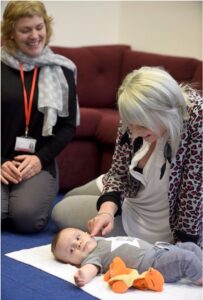Care Trust therapist says positive experiences as babies lay foundation for future mental health and wellbeing
Posted: 04 December 2023
We often think that all new babies can do is wee, poo, feed, sleep and cry. We now know that babies are really amazing, and they are capable of so much more. Over the last few years researchers have discovered that babies are born ready to relate. They need relationships, learn and develop through them, and are interested in and enjoy them.
are really amazing, and they are capable of so much more. Over the last few years researchers have discovered that babies are born ready to relate. They need relationships, learn and develop through them, and are interested in and enjoy them.
Positive relational experiences in the first two years of a child’s life promote healthy brain development, making parenting easier as the child feels more connected to the parent and deepening parent-infant bonding. Babies’ brains are shaped by their experiences and environment, and the interaction they have with parents are powerful. By understanding more about our babies, we can help their brain development and emotional well-being.
Dr Lisa Milne, Clinical Lead of Specialist Mother and Baby Mental Health Service at Bradford District Care NHS Foundation Trust shares her own experiences and why she knows babies are indeed amazing. Lisa said: “When I had my first child, I knew he would need his nappy changed, to be warm and fed often, and need lots of cuddles. But I didn’t know lots of other things about what babies’ need. I didn’t know he’d also need a companion; someone to share his moment-to-moment experiences, someone to communicate with and to make meaning with. I didn’t know that before he was even born, he knew my voice, could recognise the language I spoke, and that within hours of birth he would recognise my smell, prefer my face and prefer my voice to all others. That being held against my skin would ease his stress. That looking into my eyes and sharing a gaze with me would release positive chemicals into his brain that would actually help his brain to grow. That my baby was ‘talking’ to me from birth onwards – he was just using his body or ‘cues’ to express himself. I also didn’t know that babies are born ready to relate.”
Babies are curious people with minds of their own. Babies have incredible brains for taking in vast quantities of information, making sense of their experiences and learning from them. Research suggests that very young babies can empathise and want good things for others, not bad things, that they even have a sense of justice and are extraordinarily sensitive to other people. Babies love, and need, interaction; want to talk with and play with others.
 Lisa continued: “I didn’t know my interaction with my baby was actually helping build my baby’s brain and that joyous moments might be particularly powerful for shaping my baby’s brain. I can remember finding it very stressful when my baby cried. Other people would tell me that “babies just cry – they are exercising their lungs” and that if I kept trying to comfort my baby I would “build a rod for my own back”. Interestingly, we now know that if the parent picks up a baby when they are sad and distressed the parent is actually helping to stop stress chemicals flooding their baby’s body and positive chemicals are released instead. What is more, babies who are more responded to end up being better at managing their emotions than babies who are left to cry.”
Lisa continued: “I didn’t know my interaction with my baby was actually helping build my baby’s brain and that joyous moments might be particularly powerful for shaping my baby’s brain. I can remember finding it very stressful when my baby cried. Other people would tell me that “babies just cry – they are exercising their lungs” and that if I kept trying to comfort my baby I would “build a rod for my own back”. Interestingly, we now know that if the parent picks up a baby when they are sad and distressed the parent is actually helping to stop stress chemicals flooding their baby’s body and positive chemicals are released instead. What is more, babies who are more responded to end up being better at managing their emotions than babies who are left to cry.”
It is not easy having a baby. Parents often feel tired, sleep deprived and feel the demands of childcare can feel quite relentless at times. There are a lot of chores to do as a parent. Many women find that it takes time to fall in love with their baby. 70% of women don’t fall in love with their baby immediately, but need to get to know their baby and build a relationship with them before they feel that they love their child. However, the more we can understand our babies, the more interesting, inspiring and fascinating they can be.
Lisa concluded: “What I’d like for all parents is that they know more than I did about how amazing their baby is and to know how valuable they are. After all, by being with their baby, parents are shaping their baby’s brain. By treating our babies as if they have minds of their own, we are actually helping our babies to develop. And, if we can all support parents and babies to enjoy the joy then we will have happier and healthier families and communities.”
Parent-infant relationships are vital for children’s development to ensure babies and infants develop physically and mentally. To find out more about how parents can become more attuned to the needs of their infants and the importance of healthy social and emotional development, visit: www.readytorelate.bdct.nhs.uk
For professionals working with families with babies, the Care Trust has also developed free Ready to Relate training to support strong parent-infant relationships, visit: nhsbdctstaging.wpenginepowered.com/enroll-on-ready-to-relate-training/